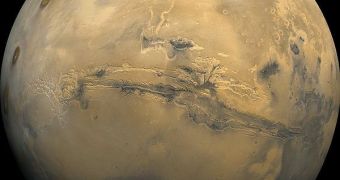NASA Administrator Charles Bolden said on Wednesday, April 6, that the International Space Station (ISS) is a vital stepping stone on our quest to explore the Red Planet. The orbital facility provides a critical test platform for technologies that will be used during long-term, space exploration missions.
He also added that humans are well on their way to becoming capable of visits to our neighboring planets. The official made the statement at the two-day International Space Station and Mars Conference, which was held at the George Washington University (GWU).
NASA remains committed to this goal, Bolden added, and is taking steps towards ensuring that astronauts will visit Mars in the next couple of decades. However, he underlined that there are numerous issues that need to be handled before that becomes a reality.
“The International Space Station is the centerpiece for our human exploration and our spaceflight endeavors in the coming decade,” he told space industry representatives, former astronauts, scientists and educators gathered at the conference.
“I like to say it's our anchor for the future of human exploration. The station is our start to the journey outward,” the official said. The orbital lab provides us with the necessary logistics platform to test nearly all types of technologies that would be used during a trip to the Red Planet.
This is evidenced by the amount of innovation present in the station itself. Its existence itself is a product of international cooperation, of the type that will also be needed when designing a Mars-bound exploration program, Space reports.
Five space agencies – NASA, ESA, RosCosmos, JAXA and CSA – are involved in the $100 billion project, which was set in motion in 1998. Among themselves, these agencies represent 15 countries.
After more than a decade of construction efforts, NASA has finally added its last module to the research facility recently. The station will be officially completed once the Russian Federal Space Agency delivers its final research module to low-Earth orbit (LEO), in 2012.
“Over the next 10 years, we'll continue to collaborate with other nations to live and work together in space, and perform cutting edge research and technology demonstrations that are critical to our eventual exploration into deep space with humans,” added Bolden.
“The ISS is the most realistic analog we have to test life support and other technologies, ensuring they function in space, and most importantly, that they are reliable,” he said in his keynote address.
“Any mission to Mars is likely to be a global effort," Bolden said. "The ISS is a blend of goals among the participating space agencies, and it is truly beautiful in that regard alone,” the NASA expert concluded.

 14 DAY TRIAL //
14 DAY TRIAL //